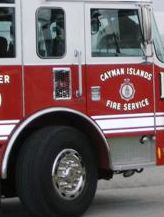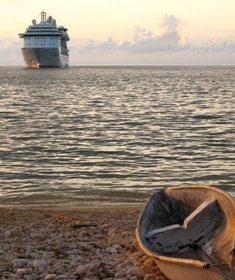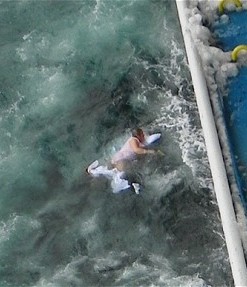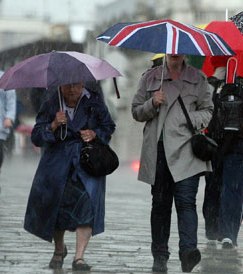Archive for April, 2011

Taxpayers told to come clean
 (CNS): The introduction of new legislation in the United States has raised concerns among Caymanians holding US passports and green cards who have not been paying what they owe to Uncle Sam. At a specialist seminar last week it emerged that a significant number of people may have been avoiding – whether deliberately or not — paying money owed to the US government. The professional presentation on tax-related obligations raised complex legal issues but it also spelt out the need for them to come clean and start filing tax returns. The new law means their own banks will be forced to reveal their assets leading to severe tax penalties if they don’t take action.
(CNS): The introduction of new legislation in the United States has raised concerns among Caymanians holding US passports and green cards who have not been paying what they owe to Uncle Sam. At a specialist seminar last week it emerged that a significant number of people may have been avoiding – whether deliberately or not — paying money owed to the US government. The professional presentation on tax-related obligations raised complex legal issues but it also spelt out the need for them to come clean and start filing tax returns. The new law means their own banks will be forced to reveal their assets leading to severe tax penalties if they don’t take action.
“My advice is you need to file income tax returns, get back in the system and file the FBARs,” the people were told by William Davis, a Dallas based tax attorney and one of a number of experts at the seminar hosted by the finance ministry to explain the implications of the new law on US/Caymanians.
He told the packed Marriot ballroom that the game would change in January 2013 with the onset of the Foreign Account Tax Compliance Act (FATCA).
“You have bank accounts in Cayman and your banker’s going to have to report those accounts…so it goes from maybe the IRS will never know to ‘Hey, my bank told the IRS that I’ve got bank accounts,” Davis warned.
FACTA was enacted as part of the goal to clamp down on US tax evasion all over the world, and it was apparent that a significant number of people here in the Cayman Islands left the IRS system and have not been filing returns. It is not exactly clear how many US citizens living in Cayman have not fulfilled their obligations to the Internal Revenue Service, in direct contravention to US law, but after the seminar, attended by more than 300 people, many stayed to seek advice from the assembled tax experts.
Along with the implications of FATCA, the experts explained that US citizens, in addition to filing tax returns, are also obligated to file annually a Report of Foreign Bank and Financial Accounts, or FBAR, which details any overseas accounts that in total hold more than US$10,000.
The overseas and local experts who spoke during the seminar all stressed that every US citizen has always been legally required to file tax returns no matter where the income is generated. Wherever they are residents, US citizens have to pay taxes and that is not new or different. But the enactment of FATCA will ensure that Americans with money in foreign banks will no longer be able to hide those accounts.
Failure to file an FBAR can result in a litany of financial penalties, including a civil penalty of US$10,000 per violation and payment of 50% of the aggregate of all the accounts held in a foreign bank.
At the public question-and-answer session, many of the queries focused on personal filing requirements and getting back into the IRS “system”, if returns haven’t been filed, to minimize the potential penalties. Though the FBAR requirement is decades old (it was enacted as part of the Bank Secrecy Act in 1970) it seems that many US citizens in the Cayman Islands are not aware they need to disclose the amounts held in their foreign bank accounts.
The voluntary disclosure initiative, however, allows US citizens who have been delinquent in filing tax returns or FBARs to come clean with the IRS and pay up. Although this may prove costly for those who have been avoiding paying their taxes long periods, experts said it will prove less expensive than subsequent penalties and provide the opportunity to start again with a clean slate.
Though audience members were given an opportunity to question the tax experts at the seminar, they were advised to seek additional advice on their individual situations, for which they would have to pay.
George McCarthy, Chairman of the Cayman Islands Monetary Authority, also warned against firms taking advantage of clients who need tax help. He spoke of a woman who related to him her experience when she sought help from a service provider to regularize her tax affairs.
“The price that was put on the table was $10,000,” McCarthy recalled adding that it may not sound much for some but was a lot of money for a lot of people. “I am going to suggest that for those who are going to be rendering assistance, I know that the cost of providing the service will have to be taken into account, but this is not what should be regarded as a scalping exercise.”
The CIMA boss said it required all hands on deck in order to get the issue sorted out.

Fire crews on scene as brush fire takes hold
 (CNS): Fire fighters were out battling with a brush fire which got out of control this evening along the West Bay Road, officials confirmed. Vegetation which has, according to nearby residents, been burning for most of Tuesday reached significant levels by the late afternoon presenting a challenge for fire crews. The blaze, which comes in the wake of a tough fire at the dump on Thursday, was burning behind the site of the former Courtyard Marriot off Seven Mile Beach in the bush area and had not, reportedly, impacted the hotel property. Although fire fighters were unable to offer details of how the fire started it is understood that it may relate to the dry weather.
(CNS): Fire fighters were out battling with a brush fire which got out of control this evening along the West Bay Road, officials confirmed. Vegetation which has, according to nearby residents, been burning for most of Tuesday reached significant levels by the late afternoon presenting a challenge for fire crews. The blaze, which comes in the wake of a tough fire at the dump on Thursday, was burning behind the site of the former Courtyard Marriot off Seven Mile Beach in the bush area and had not, reportedly, impacted the hotel property. Although fire fighters were unable to offer details of how the fire started it is understood that it may relate to the dry weather.
Check back to CNS later for more information on the fire.

Cruise holidays bad for liver says UK survey
 (Independent): Taking a cruise makes travelers more likely to hit the bottle, according to a survey conducted in Britain. Cruise comparison site CruiseCompare.co.uk asked nearly 1,200 respondents about their drinking habits at sea compared to vacations on dry land, and found that the majority said that they quaff more aboard. In results released last week, more than three quarters of respondents said that they drank more alcohol on a cruising holiday compared to a vacation on dry land, compared to 13 percentwho claimed their consumption was roughly equal.
(Independent): Taking a cruise makes travelers more likely to hit the bottle, according to a survey conducted in Britain. Cruise comparison site CruiseCompare.co.uk asked nearly 1,200 respondents about their drinking habits at sea compared to vacations on dry land, and found that the majority said that they quaff more aboard. In results released last week, more than three quarters of respondents said that they drank more alcohol on a cruising holiday compared to a vacation on dry land, compared to 13 percentwho claimed their consumption was roughly equal.
A whopping 44 percent of respondents, the majority, admitted to knocking back between five and eight alcoholic beverages a day on a cruise, while 13 percent said that they would drink even more than that.

Butterfield begins recovery following ‘difficult’ year
 (CNS): Butterfield Bank reported a profit on Tuesday for the first quarter net of 2011 compared to last year’s losses. After what bank officials described as a difficult 2010, this year is getting off to a much better start for the group with an income of $8.4 million compared to the net loss this time last year of $176.3 million. Brad Kopp, Butterfield’s President & Chief Executive Officer, said the bank was pleased to report the profit following a “difficult transitional year”, and said it pointed to the underlying strength of the bank given the challenging, low-interest rate economy in which it managed to make a profit.
(CNS): Butterfield Bank reported a profit on Tuesday for the first quarter net of 2011 compared to last year’s losses. After what bank officials described as a difficult 2010, this year is getting off to a much better start for the group with an income of $8.4 million compared to the net loss this time last year of $176.3 million. Brad Kopp, Butterfield’s President & Chief Executive Officer, said the bank was pleased to report the profit following a “difficult transitional year”, and said it pointed to the underlying strength of the bank given the challenging, low-interest rate economy in which it managed to make a profit.
During last year Butterfield raised $420 million of new capital from institutional investors and $130 million from a Rights Offering to existing shareholders, allowing management to proactively address the problems of underperforming assets—non-performing hospitality loans and asset-backed securities investments—that had hindered the company’s financial performance, it said. It sold most of the asset-backed securities in its investment portfolio and moved to restructure, settle or otherwise address non-performing assets in its credit portfolio made savings through managing expenses of 18.1% .
“Over the past twelve months we have concentrated our efforts on de-risking the balance sheet and rationalising our business model,” Kopp said. “We emerged from 2010 with a strong balance sheet, over $1 billion of capital, and an executive management team that is focused on developing our core businesses of community banking and wealth management. Although the protracted economic recovery and persistent low interest rates are challenging for the Bank, with our first quarter profit, we are already seeing the benefit of that restructuring and rationalisation.”
Brad Rowse, Chief Financial Officer explained that the sale in 2010 of securities gave the bank excess liquidity to invest in higher-yielding, low risk securities in the last quarter of the 2010. “We are beginning to see the benefit of that strategy and, despite the low-rate environment in which we are currently operating, our quarterly net interest income before provision for credit losses, at $51.4 million, was up over 20% year on year,” he said. “Non-interest income was down in Q1 2011 versus the same period in 2010 by 16.8% due principally to lower foreign exchange and asset management revenues, down 14.0% and 6.1%, respectively, which are reflective of current economic circumstances in our markets, as well as the comparative impact of non-recurring items that occurred last year.”
During the first quarter of 2011, Butterfield said it was selling its equity interest in fund administrator Butterfield Fulcrum as it was no longer considered by management to be a core business for the bank. The sale, officials added, is expected to close in the second quarter
The bank also noted that the Cayman operations successfully converted to the new technology platform over the past weekend and Bermuda is scheduled to convert late in the third quarter.
Wilton Dolloff, Executive Vice President and Chief Operating Officer, said the new systems will allow Butterfield to operate more efficiently, “The new systems will also allow for quicker delivery of new products to multiple markets and better online services,” he added.
The Board declared $4.0 million of dividends on the bank’s 8% Non-Cumulative Perpetual Limited Voting Preference Shares to be paid on 15 June 2011 to Preference shareholders of record on 1 June 2011. No common share dividend was declared.
See the full report below.
Hospital offers on-line payment service
(CNS): The Health Services Authority (HSA) has become one of the first public authorities to offer the public the ability to pay on-line, in an effort to get more customers to pay their bills on time. The creation of an online payment service in conjunction with FirstCaribbean International Bank will allow customers to pay their medical bills electronically. While most government departments are still wanting cash or at best debit card payments the HSA is taking a more modern approach at least for those people banking with First Caribbean. Officials said the service reduces time, cost and risks related to handling cheques and cash, provides round-the-clock flexibility and access.
The system eliminates the trouble of creating monthly standing orders, and the time and trouble customers need to take to visit HSA offices and stand in line. HSA Chief Executive Officer Lizzette Yearwood said the arrangement with FirstCaribbean International Bank was a major step forward for the healthcare provider, and that she was encouraged by the convenience it provided to bank customers.
“It is a hopeful sign and very much the direction in which the HSA has long needed to move,” she said. “It is a tremendous facility, of course, for FirstCaribbean customers, but, more than that, a great opportunity for us as we consolidate the gains we have made in achieving financial stability. We hope this will bring home to people how important it is that they pay their HSA bills in a timely fashion.”
Yearwood said she hoped it would help give the authority a similar profile to other service providers such as the telephone, water and electricity companies.
Richard Lewis, Cash Management Sales Associate at FirstCaribbean International Bank, said that making authority invoices part of the bank’s online facilities would help the public understand that the HSA was similar to other local businesses.
“Recognising that the HSA is among the most prominent local organisations with which almost everyone in Cayman comes in contact at one time or another, and realising how important it is that people pay their HSA bills on time, we have worked long and hard with the authority to create this facility,” he said “By putting the authority into the system alongside other Cayman businesses, we make it easy to gain access to HSA payment facilities, enabling the organisation to become part of everyone’s regular monthly bill-paying routine.”
Customers wishing to use the service must have a FirstCaribbean deposit account and a registration agreement for internet banking. The bank will configure the details and then once an internet customer people can click on the “Bill Payments” section, register their bill, then select from a drop-down menu the name of the company they wish to pay whichwill now include the HSA.Users will enter account details, then hit “verify” and then “confirm registration”. Once they have entered the amount to be paid, the bank account they wish to use, clicking on “pay bill” at the bottom of the page completes the payment.
“We think this will prove a popular and added-value service for our customers, and we are pleased to be able to offer it,” said Lewis. “Anything that helps streamline the financial well-being of Cayman’s main healthcare provider must be a good thing.”

Cuban couple deported after opting to come ashore
 (CNS): A Cuban couple who arrived in the Cayman Islands last month by boat have been repatriated, Immigration officials revealed on Tuesday. The married couple did not apply for asylum, immigration stated, and were both returned to Cuba almost two weeks ago on Wednesday, 13 April. The migrants had opted to land after the vessel in which they arrived, carrying 21 persons, was intercepted on 10 March off the north coast of Grand Cayman. They were the only ones who decided to come ashore and were subsequently processed by Immigration staff. Their companions opted to continue their journey to Honduras. (Photo Dennie WarrenJr)
(CNS): A Cuban couple who arrived in the Cayman Islands last month by boat have been repatriated, Immigration officials revealed on Tuesday. The married couple did not apply for asylum, immigration stated, and were both returned to Cuba almost two weeks ago on Wednesday, 13 April. The migrants had opted to land after the vessel in which they arrived, carrying 21 persons, was intercepted on 10 March off the north coast of Grand Cayman. They were the only ones who decided to come ashore and were subsequently processed by Immigration staff. Their companions opted to continue their journey to Honduras. (Photo Dennie WarrenJr)
So far this year, three Cuban vessels have arrived in Cayman waters and to date the man and wife were the first to choose to land and face deportation rather than continue on what is often a treachorous journey risked by other migrants.
Cayman policy dictates that the Cuban migrants cannot be assisted by the Cayman Islands if they wish to continue with their journey away from Cuba. If they request help, even food, water and fuel, they will be taken into custody and eventually repatriated to Cuba. If the migrants choose not to be deported they must leave Cayman waters unassisted.

Cruise ship passenger dropped in arctic ocean dies
 (Telegraph): Janet Richardson, the British grandmother who was dropped into the Arctic Ocean off Norway while being transferred from a cruise ship to another vessel, has died. Mrs Richardson, 73, from near Penrith, Cumbria, was taken ill on the Ocean Countess and fell into the sea while being stretchered onto a rescue vessel. She spent almost eight minutes in the near-freezing Arctic Ocean before being rescued and taken to hospital in Norway. She was later flown to Cumberland Infirmary, Carlisle, but died there on Thursday evening. Mrs Richardson, who had diabetes, left Hull on March 20, on a voyage to Norway to see the Northern Lights with her husband George, a retired farmer.
(Telegraph): Janet Richardson, the British grandmother who was dropped into the Arctic Ocean off Norway while being transferred from a cruise ship to another vessel, has died. Mrs Richardson, 73, from near Penrith, Cumbria, was taken ill on the Ocean Countess and fell into the sea while being stretchered onto a rescue vessel. She spent almost eight minutes in the near-freezing Arctic Ocean before being rescued and taken to hospital in Norway. She was later flown to Cumberland Infirmary, Carlisle, but died there on Thursday evening. Mrs Richardson, who had diabetes, left Hull on March 20, on a voyage to Norway to see the Northern Lights with her husband George, a retired farmer.
Mr Richardson, 78, said: “Unfortunately Janet died peacefully on Thursday night in the Cumberland infirmary with her family and friends around her. “We are devastated by her loss, but it brings me some comfort to know that we were with her at the end.

A sea change ahoy
Over the past few weeks and months it has become increasingly apparent that the people of the Cayman Islands are finally beginning to see the need to fight and take action for their rights, heritage, culture and above all their environment. Although I am still a relative newcomer to these beautiful islands, I dare say I have been to more public meetings than most and am in a fair position to judge a sea change when I see it.
While there may be many pressing issues to give the Caymanian people sleepless nights at the moment, from unprecedented levels of crime and unemployment to political shenanigans of almost comedic proportions, the real sea change that I see coming is about, of all things, the environment.
The penny is finally dropping for a significant number of people from a diverse range of backgrounds that it is the natural beauty of Cayman (its people included) that is the real treasure. The recent push against the proposed development of cargo ports, channels, oil refineries or any other major industrial undertaking has taken on a different shape to past moans about development. It’s no longer just about foreigners taking the profits; it is now shifting from profit to preservation.
Ironically, at a time when everyone is suffering economically, the people are not fighting to get a share of what the development pie might offer financially. The public is turning away from the bottom line and recognising that real wealth is much more than dollar signs or an investor’s empty promise.
The Save Cayman campaign, the rejection of the commercial seaport by East Enders and North Siders as well as the decisive action by the women of West Bay in their efforts to protect beach access are all illustrations of a genuine growing movement in Cayman to protect what is left of its precious, but dwindling, natural beauty.
Finally, the green revolution is here. At last the people are now focusing on environmental rights almost above all others. Even at a time when many are facing very real economic hardship and spiralling crime, the real grass roots people-power is emerging against the backdrop of the need to protect the islands’ environment and the people’s access to it.
As a result there is the tiniest bit of hope that the country is ready for the formation of a green party, a political group which will focus entirely on the need to preserve, protect and promote the natural environment, not just because it’s beautiful but because it is the country’s only genuine and real hope of a future.
The green revolution is finally coming to Cayman and it is starting where all good revolutions begin — at (aptly) the grass roots. While politicians continue to ignore the pressing need for environmental protection for Cayman’s natural resources, the people are offering to fight for it.
The politicians have dallied and delayed for too long on the National Conservation Law, fearful of losing powerful investors who still want to manipulate the environment for profit. The people, however, are no longer prepared to wait and appear to be ready to take action to protect what is left of the precious natural beauty.
With the natural resources and beauty of Cayman already so heavily exploited, future threats to what little is left appear to be genuinely galvanizing the people to act. The sea change in attitudes and momentum is there. The issue now is for someone to take the lead and spearhead the formation of Cayman’sfirst environmental pressure group and take the green fight from the grass roots to the corridors of power.

Officials dismiss LA refusal
 (CNS):The recent refusal by the Legislative Assembly to allow a member of the public to see the register which reveals the business interest of members of the country’s parliament has been dismissed as a misunderstanding by the governor’s office. According to correspondence from the governor’s staff officer to the member of the public who was refused access to the Register of Interests, the issue arose as a result of miscommunication. Despite the persistent message from the UK representative, Duncan Taylor, and his predecessor, Stuart Jack, that their main function is to promote good governance, the letter said the governor had no responsibility in “this area” but in any event the office had written to the LA about the incident.
(CNS):The recent refusal by the Legislative Assembly to allow a member of the public to see the register which reveals the business interest of members of the country’s parliament has been dismissed as a misunderstanding by the governor’s office. According to correspondence from the governor’s staff officer to the member of the public who was refused access to the Register of Interests, the issue arose as a result of miscommunication. Despite the persistent message from the UK representative, Duncan Taylor, and his predecessor, Stuart Jack, that their main function is to promote good governance, the letter said the governor had no responsibility in “this area” but in any event the office had written to the LA about the incident.
McCarron McLaughlin was refused access to the Register of Interests last month, despite having made an official appointment to view the folder. When he arrived for his 1pm appointment on Friday 25 March, he was told by staff that he would not be able to see the register as it was being updated. Section 3(3) of the Register of Interest Law 1996 states that “the register shall be open for public inspection at the office of the [LA] at all times during normal business hours.”
Even if the register is being updated it should remain open in its current state until it is updated, and should not be restricted because the registrar has not updated it.
McLaughlin went public with the refusal as well as writing to the governor, as he said he was shocked that he was not able to see the file after following the correct procedure. The incident came just weeks after the revelations that, two years after its inception, the LA’s Register of Interests Committee has never met.
The register is a crucial tool when it comes to transparency in government as it lists all of the businesses, shares, directorships and property assets (aside from their homes) owned by each of the members of the Legislative Assembly from the point they were elected to their seats. The register is designed to allow the public scrutiny of the people’s representatives and the possible conflicts of interests they might face over their business and public service.
However, concerns have been raised that the LA standing committee which is meant to supervise the register, chaired by Ellio Solomon, has never met and there has been little if any oversight of this file. In addition, the new constitutional committee appointed to monitor public ethics in government also revealed access problems to older editions of the register.
In its first report the Commission for Standards in Public Life expressed concerns over the maintenance of the register. Although the commissioners were able to review the most recent file, no other records were available to be viewed, the commission said. “The CSPL was therefore unable to ascertain whether there are perceived conflicts of interest and/or anomalies in relation to any of the declarations mandated by the Register of Interest Law (ROIL) past or present,” the report revealed. “The CPSL was unable to ascertain whether or not such registers were compliant with the Register of Interests Law 1996.”
The CSPL also said the issue of exactly who, aside from elected politicians, needs to declare their interests and which of their family members’ interests must be revealed was also in question. Members also noted the need for some meaningful sanction to ensure disclosure as mandated by the constitution and the ROIL.

Crime, weather and taxes driving British abroad
 (Telegraph): More than a third of wealthy UK residents are considering leaving the country because of high taxes, the weather and crime. A study of 1,000 people with more than £250,000 in savings and investments found 35% may move abroad because of high tax rates, while 44% blamed the weather and 43% want to avoid antisocial behaviour. Recent changes in tax rules have proved controversial for many Britons, including a combination of the 50% income tax rate on those earning more than £150,000, increases in national insurance and a reduction in personal allowances. Almost half of respondents to the Lloyds TSB research think Britons are worse offfinancially that people in other developed countries, while just 9% think people in Britain are better off.
(Telegraph): More than a third of wealthy UK residents are considering leaving the country because of high taxes, the weather and crime. A study of 1,000 people with more than £250,000 in savings and investments found 35% may move abroad because of high tax rates, while 44% blamed the weather and 43% want to avoid antisocial behaviour. Recent changes in tax rules have proved controversial for many Britons, including a combination of the 50% income tax rate on those earning more than £150,000, increases in national insurance and a reduction in personal allowances. Almost half of respondents to the Lloyds TSB research think Britons are worse offfinancially that people in other developed countries, while just 9% think people in Britain are better off.
“We are not expecting a mass exodus,” said Nicholas Boys Smith, managing director of Lloyds TSB International Wealth, “but, regrettably, many wealthy people are dissatisfied with life in the UK and are considering leaving.